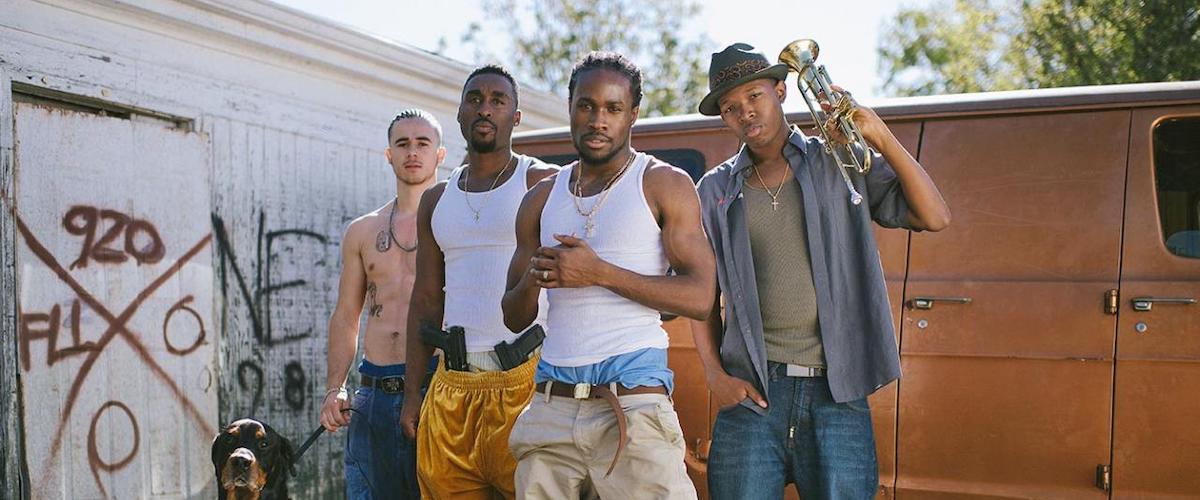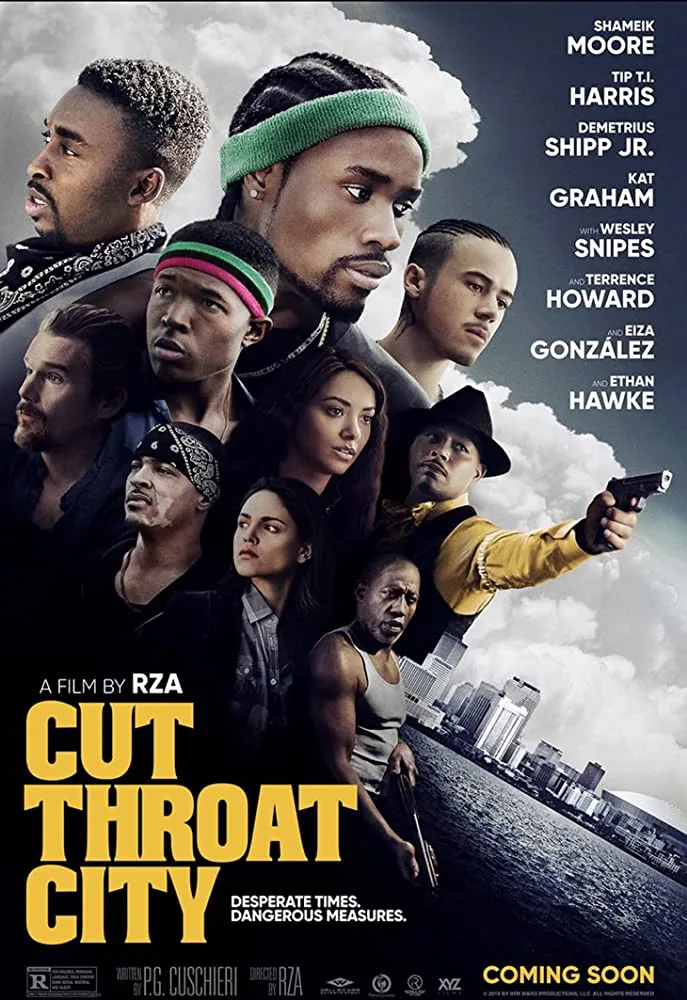“Cut Throat City” could have been the title of a 1970s exploitation picture or a film noir from the 1940s—the kind where characters get trapped in a web of conflicting loyalties and die there. It could also be the title of a muckraking documentary about a big city where life is cheap and everything else is expensive. This impressive third feature from musician-record producer RZA, about four young Black men in New Orleans who become armed robbers, operates in all three modes at once.
The result is a sprawling urban drama with eruptions of violence. It provides the intrigue that fans want from the heist genre while anchoring its twists in details about life in New Orleans a year after Hurricane Katrina—a disaster that was bungled by every level of government, and treated by corporations and real estate companies as a pretext to gentrify the city and drive out as many poor Black people as possible. Working from a screenplay by Paul Cuschieri, RZA and his collaborators take their sweet time building out supporting characters, letting them them talk about systemic racism, capitalism, gentrification, and the relationship between art and life, on top of who owes whom and what’ll happen if they don’t pay up.
The film’s main character, a drug dealer and aspiring comic book artist Blink (Shameik Moore), is our guide through a story that immediately announces itself as something more than a cinematic cash grab. The first third of “Cut Throat City” is an account of young men struggling to make their way in a harsh world that feels heightened but not unreal. The prologue is set before Katrina makes landfall. Blink gets married to his girlfriend Demeyra (Kat Graham), a single mom with an adorable young son. Blink’s pal Andre (Denzel Whitaker), a jazz musician, plays trumpet during the couple’s first dance. We meet Miracle (Demetrius Shipp, Jr.), a pride-driven hothead, and Junior (Keean Johnson), who loves his attack-trained dog more than he loves most people. RZA and Cuschieri build out the core characters’ environment in short scenes that pack a lot of information into a few lines and gestures. By the time the levees break we’re fully invested, even though we know from the movie’s description that these guys aren’t going to end up volunteering for the Red Cross.
Blink, Miracle, Andre, and Junior live in New Orleans’ 9th Ward, a predominantly poor, Black neighborhood that was treated as an afterthought by the city even before the flood waters rose. They’re street-level drug dealers, working territory ruled by Cousin Bass (rapper-producer-actor TI, in an indelible supporting performance that holds its own against heavy-hitting character actors). A sense of frustration and depression runs beneath every deal. Blink and company would gladly do something else if it paid as much as dealing. But guys like these don’t get jobs like that in post-Katrina New Orleans. They didn’t get them before the storm, either—especially if they came from the 9th Ward.
As in other socially conscious crime films—a description that covers everything from pre-World War II James Cagney star vehicles like “The Roaring Twenties” and “Angels with Dirty Faces” to “Dead Presidents,” “Belly,” “Set It Off,” and “Widows“—this movie makes sure that exploits occur within a context that illuminates (but doesn’t justify) the characters’ choices. “Cut Throat City” is fully aware that it is trying to eat its cake and have it, too, like almost every other crime or gangster film. It builds that contradiction into the characters’ dialogue, a torrent of words that often have a musical or evangelical rhythm.
The talk focuses on who the characters are and what they want or need. But it always circles back to systemic racism and poverty; multigenerational (and racially diverse) civic corruption; and a national mindset that teaches Americans that if you can only get rich and/or powerful, the law won’t touch you anymore, and the inequities that you grew up with won’t matter.
Inspired by Cousin Bass’ nihilistic sureness and serpent-tongued eloquence, and by bitterness over the government’s neglect of the storm-shattered 9th Ward, the foursome hatches a scheme to rob organizations that misused Federal Emergency Management Association checks. Their targets are casinos and banks. They’re in debt to Cousin Bass and trying to get out. But they only get in deeper.
Their crimes rouse the anger of a former corrupt cop turned city councilman, Jackson Symms (Ethan Hawke). Symms pressures police detective Lucina Valencia (Eiza González) to crack the case fast, so that the real estate investors stuffing Symms’ pockets won’t desert a city that’s beginning to “recover” (i.e. inspire outsiders to scarf up now-cheap land). Blink realizes certain details from their first job don’t add up. Cops arrived so fast that it seemed like they were tipped off. Nobody went looking for the gang afterward, even though they started a gunfight and made off with $150,000 (or so the local paper claims).
As Blink and company balance their desire to stay out of prison with commitments that keep them in town, the film spends more time with its ace supporting cast. Isaiah Washington is a crooked funeral home director who blows smoke at men who threaten him. Terrence Howard is The Saint, a smirky, insinuating top boss who carries on like he’s the pope of sin. Rob Morgan is Courtney, a corrupt cop who used to work with Symms and has one foot in law enforcement and the other in crime. Each gets an arias to show off their skill. Symms’ anguished monologue in a cemetery is a short film in itself, and perhaps a deep-cut cinephile in-joke: Hawke played Hamlet on film 20 years ago.
“Cut Throat City” is hampered by its slack storytelling rhythm, which verges on poky even though the movie repeatedly warns us that it isn’t going to be in a rush to get to the next plot point. There are other problems as well. Blink is the only lead character who feels fully thought-out; the rest are defined by one or two traits, such as Andre’s love of the trumpet and discomfort with violence, or Junior’s devotion to his friends and his dog. Gonzalez’s committed performance as the detective never overcomes the pervasive sense that the role was miscast. She’s too young to project the sort of assurance that would make somebody like Courtney or Symms think twice before sassing her. The bits of physical business that seem calculated to make the character seem more edgy and world-weary (like her De Niro-style head-tilts and cigarette habit) only underscore the problem.
More care in the writing and casting might’ve put this movie over the top. But the sum is still a substantial work, worth seeing and talking about, and made with sincerity and imagination. Photographed by Brandon Cox and edited by Joe D'Augustine and Chris Berkenkamp, “Cut Throat City” makes smart use of New Orleans locations, steering clear of tourist landmarks. Cox’s nighttime photography is vibrantly seedy, favoring hellish reds and cool blues. Costume designer Gina Ruiz makes sure that every big-name supporting actor has a look so vivid that you could sketch it from memory. (Best in show is the Saint’s introductory ensemble: a white dress shirt and pants, brown leather suspenders, Mardi Gras beads, a red bowtie and armbands, and a Panama hat with a sherbet orange band.) The dialogue is packed with quotable bits, from the description of bayou mosquitoes (“so large they could stand flat-footed and fuck a turkey”) to a character’s insistence that “we can see further through our tears than through the lens of a telescope.”
In the animated opening credits sequence, a face off between white racists and Black gangstas turns spectacularly gory—like the O-Rin Ishii sequence in “Kill Bill, Vol. 1,” but knowingly silly. Turns out the images come from Blink’s own pen. He keeps getting turned down for paid jobs, ostensibly because his material isn’t “relatable” enough, but really because the industry’s gatekeepers are upper-middle class white men who can’t relate to Blink. After Blink’s rejection, he commiserates with his three closest friends in the back of Junior’s van, smoking weed. Their conversation covers Blink’s work, his influences, and the question of how to make a story both heightened and believable.
“That shit fake, but you can feel the realness in the Mafia motherfuckers,” Blink says of the original “The Godfather.” “It doesn’t have to be this over-the-top Tarantino shit.” At first this comes across as a jab at Tarantino, who hired RZA to help supervise the soundtrack to “Kill Bill,” but it ultimately feels self-deprecating: some of the violence has a Tarantino feeling, particularly the fate of a man who loses a bet with Cousin Bass on a cage fight between raccoons and doesn’t have the money to pay up. It’s an absurd scene, but the details leading up to it make you believe in it, like the weight bench in Cousin Bass’s front yard, and the way his men glower at the foursome on their way in. That’s the realness Blink was talking about.
One of the most striking things about “Cut Throat City” is how the heroes’ progress through the underworld becomes less urgent as the tale unfolds. This, too, is by design. Part of the film’s point is that—to mangle the most famous “Casablanca” quote—the armed robberies of four young men don’t amount to a hill of beans in a city (and a country) that thinks freedom means you can never be held accountable. By the end, the film that “Cut Throat City” most resembles is “Chinatown,” with a key difference: there’s no deep, dark, secret conspiracy for anybody to expose, beyond logistical or procedural details kept hidden to guarantee the money flow. The rot is right on the surface.
Nobody in this movie loses their innocence. There’s no innocence to lose.




















